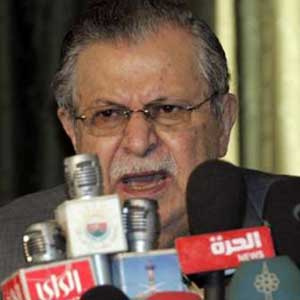A Complaint from Our Brother, President Talebani
by mohamad reza dabiri

The diplomatic etiquette does not recommend representatives of a country to use the right of response when criticized by the head of another country in international and formal circles and meetings, unless the criticism passes the limits and contains baseless claims or inacceptable allegation remaining silent against which will lead to substantiation of the claims.
However, we are not the representatives of the government and the problems we want to discuss have not been stated in an international or formal meeting.
The strange, impertinent statements attributed to the Iraqi President, or “Kak Jalal” as Tehran newspapers have called him, reported by news agencies and newspapers on the renowned 1975 international treaty, if true and not going to be denied or soothed by complementary remarks –which usually blame the translator or talk about fragmented report of the news- is deplorable, a serious warning that demands a second-thought by Ministry of Foreign Affairs and policymakers of the Islamic Republic of Iran.
Pundits knew Talebani as a prudent and experienced man, a veteran who keeps the wits around him. Even if he possesses only half of the political adroitness of “Commander of Qadisiyyah” [Saddam Hussein], he knows that after imposing a devastating 8-year war to both Iran and Iraq and being recognized as the starter of war, Saddam Hussein became regretful from what he had said and done. In a letter to the contemporary president of Iran he mentioned that now you have achieved whatever you wanted.
It is said that “Brother Jalal” knows law and is well-acquainted with international law. If true, he must explain which parts of the three interconnected sections –the so-called Package Deal- of the binding 1975 contract and its additional protocols (that were signed by Abbas Ali Khal’atbari and Sa’dun Hammadi, not by the Shah and Saddam Hussein) he disapproves?
Does he have problem with the treaty -approved by the parliaments of both countries, recorded in UN’s collection of treaties and the basis of withdrawal to recognized international borders when enacting Resolution 598- on the section that concerns delimiting the water borders of Arvand Roud (Shatt-al-Arab) by the universal principle of Thalweg line? Or are the land borders that are based on Constantinople Protocol of 1913 and 1914 delimitation proceeding against his taste?
Mr. Talebani is old enough to remember Iran has been over-generous on land borders, especially the Meimak Heights, during the Pahlavi rule. Definitely returning these parts to their rightful owner is not his concern. Or maybe the President of Iraq is angry with that part of the treaty in which the parties have agreed to control their borders in order to stop any infiltration in each others’ territory? That’s something far-fetched.
The knowledgeable President knows quite clearly that by virtue of international law, binding and acceptable principles and treaties on border accords have permanent and unchangeable nature which cannot be altered unilaterally. Resorting to arguments such as war, regime change and Rebus Sic Stantibus and arguing that Shah and Saddam have signed the treaty is not valid.
Mr. Talebani hasn’t forgotten that many treaties Iraq is taking advantages of have been signed by Malek Feisal or Amir Abdullah.
Even if we put aside the legal aspect of the issue, this claim is politically difficult to understand since Iran and the United States are becoming prepared for the fourth round of negotiations to resolve Iraq’s security problems. Unless Mr. Talebani wants to replace Arab-Israeli conflict with the long-running Arab-Iranian conflict now that attempts to disunite Shiites and Sunnis have failed. Of course considering Mr. Talebani’s insight, wisdom and good will, that is far than possible.
Ultimately we can deduce that such claims have been stated under the influence of companions for whom sectarian interests are more important that territorial integrity, national interests and security of Iraq. If our old friend takes out his Kurdish customes and wears the Iraqi customes, we will soon hear of a disclaimer by the press adviser of President’s office.

